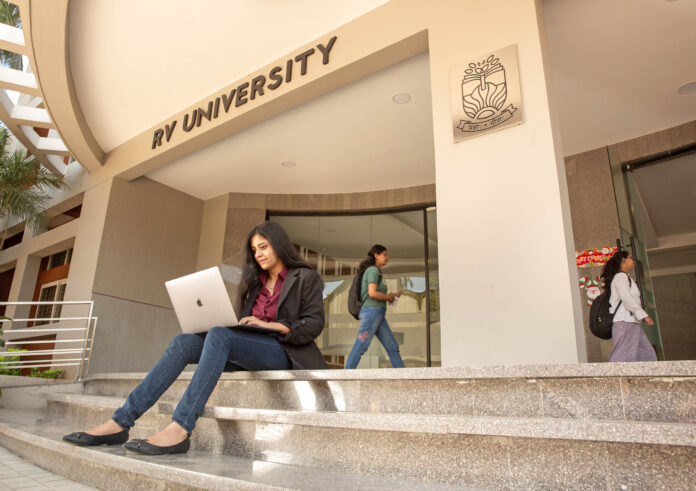Bengaluru, 8 October 2024 – A comprehensive study by RV University has uncovered alarming deficiencies in Bengaluru’s public toilet infrastructure, revealing a severe shortage of facilities and disturbing issues in terms of accessibility, inclusivity, and maintenance. The research, conducted by the Centre for Disability Justice and Inclusion (CDJI) and Centre for Gender Studies (CGS), found that only 360 public toilets serve Bengaluru’s population of over 1 crore, highlighting a critical urban planning failure that disproportionately affects vulnerable groups.
The comprehensive study, titled “Flushed Out: Unravelling the Labyrinth of Public Toilets in Bengaluru – A Tale of Access, Equity, and Quality,” was led by Assistant Professors at the School of Law, Ms. Meghna Sharma and Mr. Parvaz Lamba along with seven students from RVU’s School of Law and School of Design and Innovation.
The research revealed severe accessibility challenges, with major areas completely lacking public toilet facilities. The Jnanabharati Railway Station and popular marketplaces like Church Street and Commercial Street were found to have no public toilets. This absence forces individuals to seek facilities at considerable distances, with the nearest toilets sometimes located up to 2.9 km away. The study also found that 80% (52 out of 65) of surveyed toilets lacked route maps, hindering navigation and accessibility.
Top Courses in Agriculture
More Courses With Certification
Vice chancellor (i/c) of RVU, Prof. (Dr.) Dwarika Prasad Uniyal emphasized the urgency of the situation and the need for comprehensive reform: “The findings of our study call for immediate and decisive action from city authorities, urban planners, and policymakers. We’re not just talking about increasing the number of public toilets – though that is critically needed – but about reimagining the entire approach to public sanitation in Bengaluru. This means implementing universal design principles to ensure accessibility for all, addressing gender disparities, improving maintenance protocols, and creating truly inclusive spaces. Public toilets are not a luxury they are a fundamental right that impacts public health and urban mobility. It’s time for Bengaluru to lead by example and create a public sanitation that meets the needs of every citizen.”
ALSO READ: Applications Open for PGDM Admission at BSM Hyderabad for the 2025-27 Batch
Assistant Professor at the School of Law and Director for the Centre for Disability Justice and Inclusion (CDJI) and co-author of the report, Ms. Meghna Sharma, provided insight into the findings: “Our comprehensive research has unveiled a multifaceted crisis in Bengaluru’s public sanitation infrastructure. The severe shortage of facilities coupled with accessibility, inclusivity, and maintenance issues, paints a troubling picture of urban planning failure. What’s particularly concerning is how these inadequacies disproportionately affect vulnerable groups – women, persons with disabilities, transgender individuals, and economically disadvantaged communities. The lack of facilities not only inconveniences residents but also poses risks to public health and hinders the city’s progress.”
Assistant Professor at the School of Law and Director for the Centre of Gender Studies and co-author, Mr. Parvaz Lamba, commented “Access to clean and safe public toilets is a fundamental human right that enhances mobility, promotes inclusivity, and ensures dignity for all in public spaces. It is essential for municipal bodies to reorient their perspective and recognize public toilets as vital infrastructure that supports the well-being of the community, especially the marginalised in any community.”
Gender disparities and safety concerns emerged as critical issues. Women often pay double the amount (Rs. 10) compared with men (Rs. 5) for toilet use due to facility differences. The research highlighted a concerning lack of female staff members and inadequate privacy measures, with some male toilets visible from female sections. Only two out of 65 surveyed toilets had provisions for transgender , underscoring a critical gap in meeting diverse community needs.
Inclusivity for persons with disabilities (PWDs) was found to be severely lacking. While 14 out of 65 toilets had specific stalls for PWDs, half of these were locked, and one was inaccessible. In a stark example of mismanagement, at Shivaji Nagar Bus Stand, a disability-specific stall was being used as a storeroom.
The study uncovered widespread cleanliness and maintenance issues. 82% of toilets lacked stall-specific dustbins, leading to drainage blockages and hygiene problems. 55% used makeshift “dabba” flushing systems instead of proper flush mechanisms, deterring users and complicating maintenance. Alarmingly, 68.6% of toilets did not provide soap or hand-wash facilities, raising serious public health concerns.
The study also revealed that current toilet designs fail to address the needs of those most reliant on public facilities. A staggering 86% of toilets lacked bathing facilities, while 93% had no changing spaces. Additionally, 77% of toilets lacked proper hooks for hanging clothes, further highlighting the inadequate design considerations.
The research recommends a multi-pronged approach to address these issues:
1. Significantly increase the number of public toilets, ensuring equitable distribution across the city.
2. Implement improved route maps and signage to enhance accessibility.
3. Address cost disparities between men’s and women’s facilities.
4. Establish comprehensive maintenance guidelines and regular audits to ensure cleanliness and functionality.
5. Redesign facilities to be truly inclusive, catering to the needs of PWDs, transgender, elderly citizens, and parents with young children.
6. Incorporate facilities such as bathing stalls and changing spaces to serve the needs of gig workers, street vendors,homeless individuals.
7. Ensure adequate lighting and security measures to improve safety, particularly for women and vulnerable groups.
We have attached the report here, which includes detailed findings, comprehensive data analysis, and in-depth recommendations for policymakers and urban planners.
The authors and the research team are available for further discussions on this critical issue affecting Bengaluru’s urban landscape and public health.
Contributing researchers include Meenakshi Prabhu, Mohammed Salman, Rafa Khan, Sandhyashree Karantha Nagaraj, Sowparnika Mahadevan, Sweksha Saraf, and Thanya Jeanin A. Graphics for the study were created by Meenakshi Prabhu, Sowparnika Mahadevan, and Thanya Jeanin. The team meticulously examined 65 public toilets across various locations in Bengaluru, including parks, metro, bus stations, marketplaces, tourist spots.
About RV University:
Backed by the 84-year-rich legacy of RV Educational Institutions, RV University, which commenced operations in 2021, is a new-age, tech-driven, global university that imparts high-quality liberal education with an interdisciplinary curriculum The RV university offers 35+ undergraduate, postgraduate, and Ph.D. programmes in nine academic disciplines: liberal arts and science, design and innovation, film, media and creative arts, business, economics, computer science, engineering, law, executive education and allied healthcare studies. It has partnerships and collaborations with over 200 reputed foreign universities, institutions, and companies.
At EasyShiksha.com, students can explore internships that offer real-world learning, exposure to industry-standard tools, and hands-on experience with data.




































































